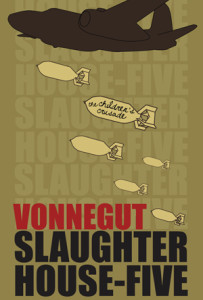 This is a fine postwar novel in the tradition of others that expressed dehumanization and even nihilism after the catastrophic death and destruction of World War II. Unlike many others (such as The Sheltering Sky, The Stranger), in this one Vonnegut keeps the tone light and humorous, even while the mood is very dark, the text describing incredible suffering and degradation. That contrast makes the book intellectually and artistically stimulating.
This is a fine postwar novel in the tradition of others that expressed dehumanization and even nihilism after the catastrophic death and destruction of World War II. Unlike many others (such as The Sheltering Sky, The Stranger), in this one Vonnegut keeps the tone light and humorous, even while the mood is very dark, the text describing incredible suffering and degradation. That contrast makes the book intellectually and artistically stimulating.
The tale opens with a first-person narrator swearing that what you are about to hear is true, then the narration evolves into a more distant third-person story, and finally, in the last chapter, comes back around to the first-person narrator. This technique allows Vonnegut to jump around improbably in time and space, from protagonist Billy’s imminent death in a plane crash, to his childhood, and even to his journey to an alien planet light years from Earth. All that time-blending conveys impressions of the war and Vonnegut’s reaction to it, outside the traditional three-act story structure – because the war erased all structures.
Vonnegut’s famous narrative tic, to follow each mention of death with the phrase, “And so it goes,” renders all death equivalent, whether the slaughter of innocents or a bottle of champagne that has gone flat (“dead”). Death, says someone who knows, is unrelated to justice, and without moral or emotional meaning. Death is inevitable anyway, so why dwell on it? Accept what cannot be changed and change the things that can be. Or as the alien Tralfamadorians advise Billy, look away from your unpleasant destiny and go to the zoo instead.
Billy is way beyond shell-shocked. He is dazed and numb, not even human throughout the war, unable to evaluate anything or respond to the horrors he experiences. He becomes unhinged when he imagines being abducted by aliens in a flying saucer. After the war he became prosperous, with a wife and child, a house in the suburbs and a big Cadillac. But even then, he is shocked to discover that he doesn’t know the first thing about adult son and has nothing to say to him. Despite the trappings of happy success, after the war former soldiers were (are) still denuded of interior life, Vonnegut says, even of himself.
Jesus on the cross was “dead as a doornail,” the narrator says, so no redemption is possible, and yet, you have to be careful nailing up a guy like Jesus, because it turns out he was very well-connected and his dad was not pleased. The message of the novel wavers between utter despair and a hopeful but timid affirmation of life as long as it is lived only in the present moment.
Vonnegut, Kurt (1969). Slaughterhouse-Five. New York: Dell/Random (215 pp).
